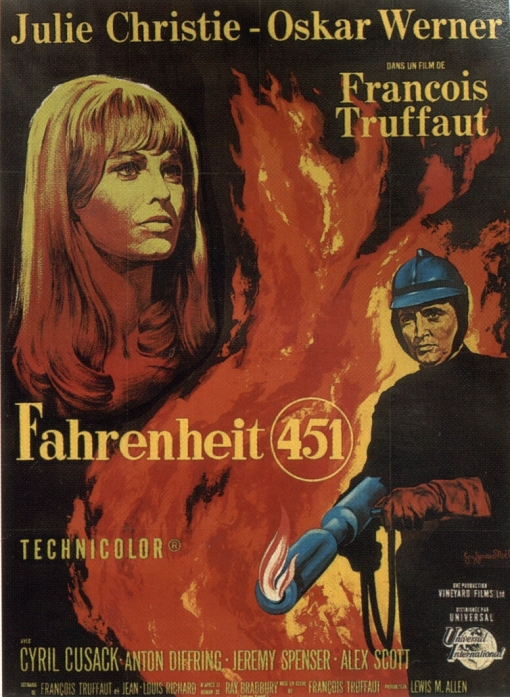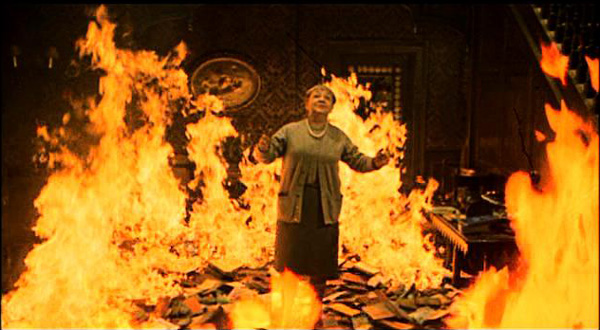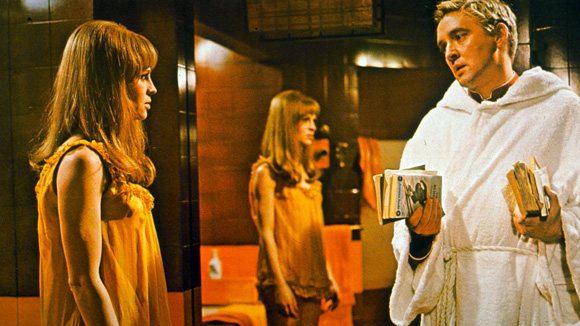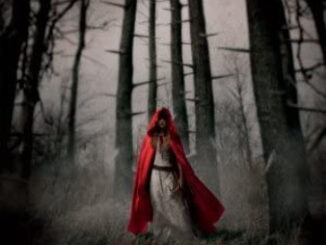Fahrenheit 451 (1966)
Directed by: Francois Truffaut
Written by: Francois Truffaut, Jean-Louis Ricard
Starring: Anton Diffring, Cyril Cusack, Julie Christie, Oskar Werner
UK
AVAILABLE ON DVD
RUNNING TIME: 114 mins
REVIEWED BY: Dr Lenera
In the future, a totalitarian government, in the interests of material well being, employs Firemen, not to put out fires, but to seek out and burn all literature, permitting them to search anyone, anywhere, at any time. One of the Firemen, Guy Montag, is seemingly happy in his life and is promoted, but on the train home one day he meets one of his neighbours, Clarisse, whose job as a schoolteacher is hanging by a thread due to her unorthodox ways. Despite having a wife, Linda, Montag starts to see more and more of Clarisse and, one night, when Linda is asleep, gets up and goes to a cupboard where he has hidden a book, Charles Dickens’s David Copperfield, he took from the last raid he was involved in. He begins to read the words and experiences a kind of epiphany. He begins to hide more books in the house and starts to question his job, especially when the Firemen have to pay a visit to the house of one of Clarisse’s friends……..
Fahrenheit 451 is a much underrated science fiction film that has little in the way of action or special effects but deserves some reappraisal as a very thoughtful presentation of a possible future with a very powerful message, a message which seems to get more and more pertinent as years go by. In these days of Kindles and talk of physical books soon becoming a thing of the past or a rarity, a film which shows us a world where books are destroyed and a small group of people attempting to keep books alive, has great resonance. I’m going to admit, I hate the idea of E-books and think that a loss of ‘real’ books would be a terrible thing for humanity. I also don’t want to spend any more time looking at a screen than I already do! I suppose if you don’t feel this way then you may not find Fahrenheit 451 as powerful, but you may still enjoy it as a slightly odd and rather charming fantasy, so long as you don’t expect ray guns, robots and stuff.
The novel Fahrenheit 451, written by Ray Bradbury, was published in 1953 and became one of the author’s most celebrated works and is often considered an attack on censorship, though Bradbury said it was more about the increasingly negative effects of TV and other mass media on literature. As was often the case, he was certainly on to something. The movie was the first and only English language production of Francois Truffaut, who made some of the masterpieces of French cinema such as Jules et Jim and Day For Night and was a key figure in the French New Wave. His script, co-written with Jean-Louis Ricard, simplified much of the novel. Most notably, gone were the explanation as to how books started to be banned and an apocalyptic finale. Shot mostly in England, it was a difficult project for the director due to his lack of English and conflict between him and star Oskar Werner, who wanted to give a more ‘robotic’ performance than Truffaut wanted. Co-star Julie Christie was originally going to just play Linda but, after the part of Clarissa had been turned down by both Jane Fonda and Jean Seberg, producer Lewis M. Allen had the strange but bright idea of having Christie play both female lead parts. The movie had a mixed reception from public and critics though its reputation, unsurprisingly, has increased over the years.
The opening credits are spoken rather than displayed, an immediate hint of what a future without the written word would be. It’s a strange future, the one in this film, which avoids many of the usual details one would expect. Houses are just like houses now. People’s clothes are not much different. They might be subject to totalitarian rule, in the manner of Nazi Germany [where books were also burnt] but seem to mostly go about their business in a normal fashion. Certain details are noticeable though. A monorail runs under the track [this was actually a real train though it was later dismantled]. Firemen can go up a pole. People seem less in number. Except for police vehicles and the gleaming red fire engine, which resembles a toy from a past childhood, the roads are clear. There is no imagination, no emotion, replaced by a kind of narcissism. While men seem to go out and ‘do the work’, the women are TV addicts, prisoners of a controlling device that masquerades as a father figure giving out reassuring messages. There is the impression of something terrible in the past, something that has made society like this. In fact, this is a horrible world, and a world which is very very plausible and which some might say isn’t that different from NOW.
What Fahrenheit becomes is a slow but steady journey of one person’s awakening, a quest where the nostalgic pull of the past becomes stronger and stronger. We see Montag going about his job, robotic and emotionless, but something isn’t right with him even before he meets Clarisse, who is the catalyst for his change. Maybe it’s the way the burning books curl as they are destroyed, like living beings with souls, in scenes which make fire look beautiful as well as deadly? Maybe it’s the sterility of his life at home? Who knows? In any case, it isn’t long before Montag gets up one night and opens David Copperfield, cautiously, like a delicate treasure that could be damaged at any time. His fingers slowly move along the words as he awkwardly begins to read. The music [one of his finest scores] by Bernard Herrmann here beautifully increases the feeling of wonder in the scene. Soon after, Montag witnesses the burning of a woman who chooses to die with her books, and on her own terms [in an oddly beautiful scene], but not before reading aloud a few words of a book so that she can hear him, and thereby know that book reading will not die out. It is not long before Montag is reading alloud to his wife and her friends, who are all appalled, except for one, who cries, with again the music, this time expressionistic and almost ghostly, giving the scene considerable poetry.
Of course you know it’s all going to lead to conflict with the authorities, especially his boss the Captain, superbly played by Cyril Cusack, who may have a friendly, fatherly manner but gives the impression he always knows what is going on in Montag’s mind, and Fabian, the rather sinister co-worker who always seems to be spying on Montag [even, in one weird and uncanny bit, in drag], and could probably not have been played by anyone else than perrenial screen Nazi Anton Diffring. Fahrenheit 451 rarely goes in the fashion you expect it to though. Truffaut doesn’t seem too bothered at providing mounting tension and seems ill at ease with the small amount of action at the end. Nor does he give the impression that Montag and Clarisse have much romantic interest in each other. Instead, he’s more interested in strange little moments like Montag accidentally terrifying a young boy at a school, or a possible informer circling a post box undecided whether to post the name of someone who has books or not, or another young boy watching – either in awe or in horror it’s hard to tell – a burning from the safety of his bedroom window. There is no doubt that the movie will disappoint if you expect the obvious stuff you will expect to see, but I like it for that very reason, the fact that is does not do what you expect.
What special effects there are, it must be admitted, are none-too-impressive, especially an atrocious shot of Firemen flying with jet packs, the wires supporting them being so visible it looks like you are watching an episode of Thunderbirds. The lead performances by Oskar Werner and Julie Christie, who fails to differentiate between her two parts enough, are stiff and awkward, though at least Werner had some excuse as, like Truffaut, he didn’t know English But set against any flaws are a final 15 minutes of great beauty, where we meet the Book People, each of whom has ‘become’ a book, committing it to memory before destroying it, ensuring that the content of the book will remain inside the person until the time comes where it is safe to write it down again. The image of figures, wondering around by a lake, reciting to themselves, is both poignantly sad and very hopeful, and combined with unintended snowfall on the day of shooting and Herrmann’s bittersweet music which is a kind of lament for humanity, makes for an incredibly touching finale. And this is even if you don’t see the similarities between the Book People and Now, where it seems books are having to change in order to survive. Personally, I think that the thought of future generations being unable to experience the joy of opening a book is incredibly sad.
The score is truly fantastic throughout; I haven’t yet mentioned the modernistic march that accompanies the fire engine, or the wild swirling figures, replete with harps going berserk, that go with the burning scenes. Nicolas Roeg’s photography is gorgeously lush and vibrant. I love Fahrenheit 451 the way it is, its troubled production resulting in a very offbeat feel which I feel is right for the subject and makes the film quite unique. Even if you watch the movie and find it unsatisfactory, or even dare I say boring, just look around you. It’s coming true. Huckleberry Finn has been rewritten to remove the word ‘nigger’ in the interests of ‘political correctness’. People are becoming so constantly ‘connected’ with every electronic gadget that comes along that they are losing the time, and even the will, to have some time to themselves and actually think. The mass media is becoming more and more controlling yet more and more witless. IT’S HAPPENING!
Rating: 
















Be the first to comment